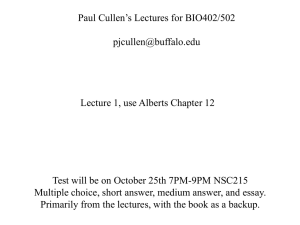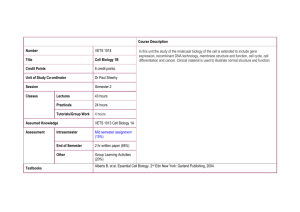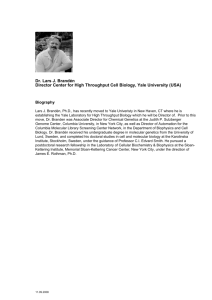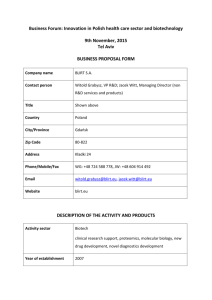Web Page: http://jan.ucc.nau.edu/~es64/bio369.htm
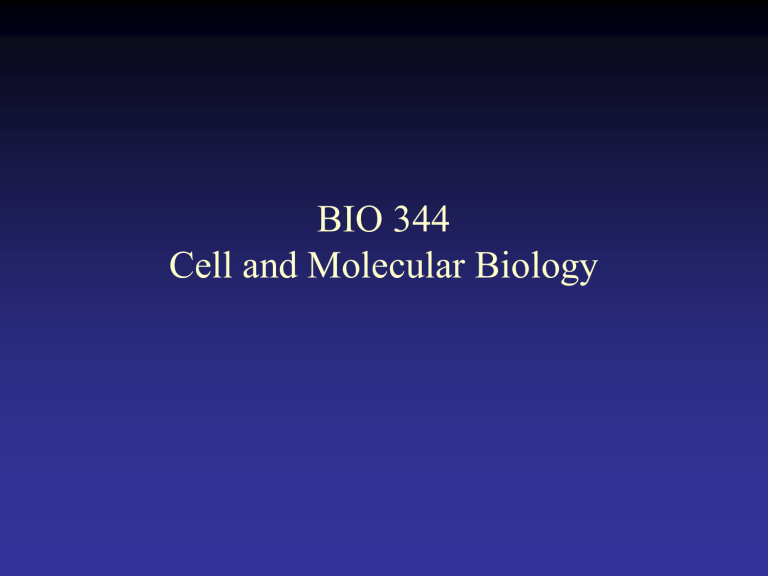
BIO 344
Cell and Molecular Biology
Course description :
Organization and function of biological molecules, cell diversity, cell structure and function, and cell interaction .
Prerequisites: BIO 181, CHM 152,
BIO 220 or BIO 205
Egbert Schwartz
Biology Building room 250
523-6168
Egbert.Schwartz@nau.edu
Lectures: Tuesday and Thursday; 9:35 a.m. – 10:50 p.m. room 265 Biology building
Office Hours
• Monday 12-1
• Thursday 11-12
• By appointment
• Walk-in
BOOK (required)
• Molecular Biology of the Cell, 2002, 4 th or 5 th edition. Alberts, Johnson, Lewis,
Raff, Roberts and Walter.Garland
Science, New York, NY.
Web Page: http://jan.ucc.nau.edu/~es64/bio344.htm
Exams:
• There will be three exams and a final.
• The final will cover all material from the class.
• You may elect to not take the final if you are happy with the grades on your exams
Grading
: if you don’t take the final
• Exam I
Exam II
Exam III
33 %
33 %
33 %
• A = 90-100
B = 80-89.999
C = 70-79.999
D= 60-69.999
Grading : if do take the final
• Exam I
Exam II
Exam III
Final
20 %
20 %
20 %
40%
• A = 90-100
B = 80-89.999
C = 70-79.999
D= 60-69.999
If the final exam lowers your overall grade it will not be counted in calculating your final grade. Thus you can’t lose by taking the final.
Makeup tests
• You will need to make special arrangements with me if you want to take the test at another time. You will need a valid excuse such as a medical emergency or religious holiday.
Arrangements must be made prior to the exam.
Attendance
• Attendance for this class is not required.
However, because most questions will come directly from the lectures, the probability of receiving a decent grade without attendance is very small.
Recognize that the book is very difficult and part of the book will not be on the exam
Brief preview of lectures chapter 10 – 13, 15-19
Membrane structure
Membrane Transport
Protein sorting
Vesicular transport
Cell to cell communication
Cytoskeleton
Cell Cycle and Cell Death
Cell Division
Cell Junctions and Adhesion
The response of blood platelets to injury
Platelets prior to activation
Ca 2+ and diacylglycerol activate protein kinase C
Actin filament dynamics and platelet activation in
Actin filament dynamics and platelet activation
Activated platelet with large spread lamellipodium
Activated platelet after contraction
Membrane Structure
Chapter 10
1
4.7 – Part 1 figure 04-07a.jpg
Eukaryotic Cell
2
The plasma membrane is a lipid bi-layer
2-dimensional model of plasma membrane
3-dimensional model of plasma membrane
3
Phosphatidylcholine
4
Phosphatidylcholine
Phosphatidylcholine
Polar molecule dissolved in water
5
Arrangement of water molecules is barely disturbed
Non-polar molecule dissolved in water
Arrangement of water molecules strongly disturbed
Shape of lipid determines packing of lipid molecules
Shape of lipid determines packing of lipid molecules
Figure 10-11a Molecular Biology of the Cell (© Garland Science 2008)
Formation of sphere is energetically favorable
Figure 10-9a Molecular Biology of the Cell (© Garland Science 2008)
Figure 10-9b Molecular Biology of the Cell (© Garland Science 2008)
Figure 10-11b Molecular Biology of the Cell (© Garland Science 2008)
Figure 10-11 Molecular Biology of the Cell (© Garland Science 2008)
Effect of cis double bonds on membranes
Figure 10-12 Molecular Biology of the Cell (© Garland Science 2008)
1:1 phosphotidylcholine and sphingomyelin
Figure 10-13 Molecular Biology of the Cell (© Garland Science 2008)
1:1:1 phosphotidylcholine and sphingomyelin and cholesterol
Figure 10-14b Molecular Biology of the Cell (© Garland Science 2008)
Figure 10-14a Molecular Biology of the Cell (© Garland Science 2008)
6,7
DVD clip 36
9
Cholesterol
Cholesterol
Cholesterol
Cholesterol in lipid bilayer
DVD Clip 37
10
11
Lipid composition varies among different cell types
